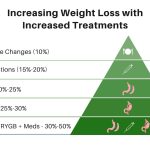 What are the benefits of using prescription weight loss medications?
What are the benefits of using prescription weight loss medications?
While medications have existed for decades to treat weight, older generations of medications were often minimally effective and frequently caused problematic side effects. While these older medications can still be helpful options for some patients, the newer GLP-1 agents have a significant advantage over older medications. These newer GLP-1 medications target the hormonal dysregulation of body weight to lower our body’s set point, or the weight your body is trying to defend. They also have beneficial effects on blood sugar regulation, blood pressure, blood cholesterol and other aspects of metabolic health. Many patients ask whether these medications need to be used long-term or can be stopped after a few months. Studies show that the disease of obesity should be viewed as a chronic disease and therefore, as with any other chronic disease such as diabetes, high blood pressure or high cholesterol, deserves long-term treatment. You can read more about why we recommend long-term treatment of obesity.
What are some of the most common prescription medications for weight loss?
- As discussed above, GLP-1 medications are currently the most effective and safest medications used for weight loss. These include:
- Mounjaro
- Zepbound
- Wegovy
- Saxenda
- Ozempic
- Rybelsus
- Victoza
- Trulicity
- There are also other medications used for weight loss which may be appropriate in specific cases. These are often less effective than the GLP-1 medications and some come with more side effects. The risks and benefits of which should be discussed with a trusted healthcare provider. In our clinic, we may consider using these medications in specific cases for those without GLP-1 coverage or for those who cannot take GLP-1 medications. They include:
- Phentermine
- Qsymia (or Phentermine plus Topiramate)
- Contrave (or Bupropion plus Naltrexone)
- Metformin
How do you know if GLP-1 weight loss medications are covered?
- Because of numerous historical and political factors, most insurance companies do cover medications for the purpose of weight loss. Medicare does not cover any medications specifically for weight loss and while some commercial plans do have coverage, these plans are few and far between. For this reason, we often use medications “off-label”, meaning that we use medications, approved for other uses by the FDA (such as diabetes), for the purpose of weight loss. This is a very common practice in medicine and is safe as long as research provides evidence for this expanded use.
- A good example of this is with Wegovy, which is a GLP-1 medication approved for weight loss. Wegovy contains the same molecule (semaglutide) as Ozempic and Rybelsus, which are only FDA-approved for Type 2 Diabetes. In people without diabetes, we will often prescribe these medications and other GLP-1 medications “off-label” if a patient does not have coverage for Wegovy itself. It is often easier to get these medications covered, even in some patients without diabetes, than the version approved for weight loss.
- Another great example is Mounjaro, a GLP-1 and GIP medication. Mounjaro is the most impressive weight loss medication available to date (you can read more about it in this article), but has only been approved as of yet for treating diabetes (the company is still seeking approval for weight loss). In our clinic, we frequently use Mounjaro off-label for those without diabetes which can provide a big cost-savings to patients with the discount programs discussed below.
What are my options if GLP-1 weight loss medications are not covered by my insurance?
- As we mentioned above, even if you do not have coverage for weight loss medications on your plan, many GLP-1 medications are more affordable when prescribed off-label. If your plan has no coverage for GLP-1 medications, there are some prescription savings coupons available that may still make these medications affordable for you. For example, there is a prescription savings coupon for Mounjaro which can bring the cost down to $25 per month for those with commercial insurance, even if their plan has no coverage for this medication. For those without commercial insurance coverage or for whom GLP-1 medications are too expensive, your healthcare provider may talk to you about other options for obtaining these medications (such as from a Canadian pharmacy) or may discuss with you other medication options which are generic and more affordable without insurance coverage. We suggest you talk to your prescribing provider about which of these options may be right for you.
How to find affordable coverage for weight loss prescription medications/Is there a way to get coverage for my weight loss prescription medications?
- Determining whether or not you have coverage for the new GLP-1 weight loss medications can be quite difficult. In order to verify coverage, you can call the “Pharmacy Benefits” (sometimes listed as Rx benefits) phone number listed on your insurance card and ask them the questions listed on this questionnaire. This call will take 10-15 minutes to complete. You will need to speak to an agent to complete the questions. After completing the questionnaire, you can enter your email address and we will send you an analysis of your most likely to be covered GLP-1 weight loss medication options. This information can help your prescribing provider navigate the often difficult and time-intensive insurance approval process.
Does my insurance cover weight loss surgery and, if so, how do I get my surgery covered by insurance?
- Is weight loss surgery covered by insurance?
- Many insurance companies cover weight loss surgery; however, coverage ultimately depends on your specific policy and, if your insurance is provided through employment, can be determined by your employer.
- How do I find out if my insurance covers weight loss surgery?
- To determine if you have bariatric surgery coverage, you can call the customer service or member number on the back of your insurance card or, if your insurance is provided through employment, you can reach out to your human resources department to see if weight loss surgery is a covered benefit. Oftentimes, weight loss surgery clinics will provide benefit checks as a courtesy for new patients.
- If my insurance covers weight loss surgery, how soon can I schedule surgery after my surgical consult?
- Even if you have weight loss surgery coverage, it is very common for your insurance company to have specific criteria that must be met before they will agree to cover your surgery. These criteria often overlap with the pre-surgery requirements of your surgeon. Common criteria include:
-
-
- BMI of 40 or higher, or BMI of 35 or higher with a comorbidity such as diabetes or hypertension
- Monthly medical supervised weight loss appointments (2-12 months)
- Upper Endoscopy to evaluate for reflux/Barrett’s Esophagus
- Nutritional counseling with a Registered Dietitian
- Psychological evaluation and clearance by a licensed psychologist or psychiatrist
- Cardiac evaluation and clearance by a cardiologist
- Screening for obstructive sleep apnea
- Smoking cessation
- There may be additional requirements as determined by your insurance company or surgeon, which will also need to be completed before submitting your surgery for approval
-
- Once your criteria are met, your surgeon’s staff will work on getting approval for your surgery. This process can take up to 30 days. Once all criteria are met and your insurance has approved your surgery, you can be scheduled.
4. What if my insurance doesn’t cover weight loss surgery?
- Many weight loss surgery clinics offer self-pay options. If you are unsure, reach out to our office at (520) 298-3300 and one of our faculty members will be happy to help you find a self-pay option to fit your needs and budget as well as answer any additional questions you may have.
5. How can I be successful on my journey to weight loss surgery?
- Communication is KEY! Many weight loss clinics provide patient coordinators that are available to assist you during the process. These staff members are very familiar with the process and your requirements and want to see you succeed. Unsure of what your next steps are? Just reach out, they are happy to help.




Do you have an office in Florida? Or do you offer Telemedicine visit in Florida
Sorry, right now, the answer is no to both.
We are rolling this out right now, you can call the office (520) 298-3300 for more info.
Does AHCCESS United health insurance cover for weight loss medication?
Unfortunately, no, none of the AHCCCS plans cover GLP-1 medications.